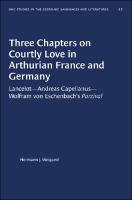Three Chapters on Courtly Love in Arthurian France and Germany
Lancelot—Andreas Capellanus—Wolfram von Eschenbach's "Parzival"
| dc.contributor.author | Weigand, Hermann J. | |
| dc.date.accessioned | 2020-06-23T07:31:26Z | |
| dc.date.available | 2020-06-23T07:31:26Z | |
| dc.date.issued | 1956 | |
| dc.identifier | ONIX_20200623_9781469658629_17 | |
| dc.identifier | OCN: 592796932 | |
| dc.identifier.uri | https://library.oapen.org/handle/20.500.12657/39769 | |
| dc.description.abstract | By analyzing Chrétien's "Cligès", Ulrich von Zatzikhoven's "Lanzelet", Chrétien's "Chevalier de la Charette", and the Old French "Prose Lancelot", as well as Andreas Capellanus' "De Amore" and Eschenbach's "Parzival", Weigand presents a picture of the ideals of courtly love in Europe in the latter half of the twelfth and beginning of the thirteenth centuries. A long chapter on "Parzival" focuses especially on the introduction of Christian themes and changing ideas of the compatibility of love and marriage. | |
| dc.language | English | |
| dc.relation.ispartofseries | UNC Studies in the Germanic Languages and Literatures | |
| dc.subject.classification | thema EDItEUR::D Biography, Literature and Literary studies::D Biography, Literature and Literary studies::DS Literature: history and criticism | en_US |
| dc.subject.other | German Studies | |
| dc.subject.other | Literature | |
| dc.title | Three Chapters on Courtly Love in Arthurian France and Germany | |
| dc.title.alternative | Lancelot—Andreas Capellanus—Wolfram von Eschenbach's "Parzival" | |
| dc.type | book | |
| oapen.identifier.doi | 10.5149/9781469658629_Weigand | |
| oapen.relation.isPublishedBy | 29b4cf74-8c0a-422f-9d27-e862ca722861 | |
| oapen.relation.isFundedBy | 0314e571-4102-4526-b014-3ed8f2d6750a | |
| oapen.relation.isFundedBy | 0cdc3d7c-5c59-49ed-9dba-ad641acd8fd1 | |
| oapen.series.number | 17 | |
| oapen.pages | 72 | |
| oapen.place.publication | Chapel Hill | |
| oapen.grant.number | [grantnumber unknown] | |
| oapen.grant.number | [grantnumber unknown] | |
| oapen.grant.program | Humanities Open Book Program | |
| oapen.grant.program | Humanities Open Book Program |

